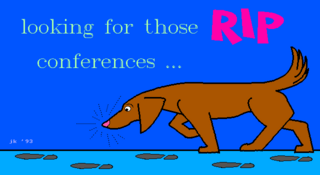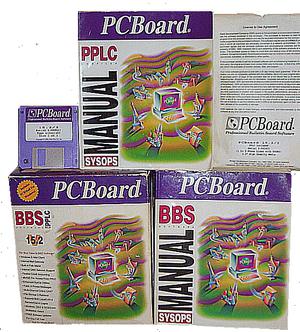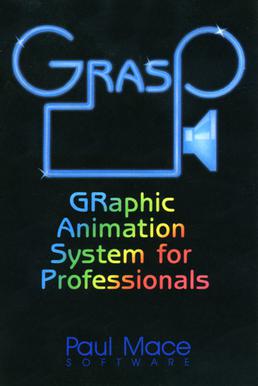
A bulletin board system (BBS), also called a computer bulletin board service (CBBS), is a computer server running software that allowed users to connect to the system using a terminal program. Once logged in, the user could perform functions such as uploading and downloading software and data, reading news and bulletins, and exchanging messages with other users through public message boards and sometimes via direct chatting. In the early 1980s, message networks such as FidoNet were developed to provide services such as NetMail, which is similar to internet-based email.
Kermit is a computer file transfer and management protocol and a set of communications software tools primarily used in the early years of personal computing in the 1980s. It provides a consistent approach to file transfer, terminal emulation, script programming, and character set conversion across many different computer hardware and operating system platforms.

WordPerfect (WP) is a word processing application, now owned by Alludo, with a long history on multiple personal computer platforms. At the height of its popularity in the 1980s and early 1990s, it was the market leader of word processors, displacing the prior market leader WordStar.
AppleLink was the name of both Apple Computer's online service for its dealers, third-party developers, and users, and the client software used to access it. Prior to the commercialization of the Internet, AppleLink was a popular service for Mac and Apple IIGS users. The service was offered from about 1986 to 1994 to various groups, before being superseded by their short-lived eWorld and finally today's multiple Apple websites.

The Remote Imaging Protocol and its associated Remote Imaging Protocol Script language, RIPscrip, is a graphics language that provides a system for sending vector graphics over low-bandwidth links, notably modems. It was originally created by Jeff Reeder, Jim Bergman, and Mark Hayton of TeleGrafix Communications in Huntington Beach, California to enhance bulletin board systems and other applications.
Synchronet is a multiplatform BBS software package, with current ports for Microsoft Windows, Linux, and BSD variants. Past versions also ran on MS-DOS and OS/2, but support for those platforms were dropped in version 3.0.

PCBoard (PCB) was a bulletin board system (BBS) application first introduced for DOS in 1983 by Clark Development Company. Clark Development was founded by Fred Clark. PCBoard was one of the first commercial BBS packages for DOS systems, and was considered one of the "high end" packages during the rapid expansion of BBS systems in the early 1990s. Like many BBS companies, the rise of the Internet starting around 1994 led to serious downturns in fortunes, and Clark Development went bankrupt in 1997. Most PCB sales were of two-line licenses; additional line licenses were also available.

The Major BBS was bulletin board software developed between 1986 and 1999 by Galacticomm. In 1995 it was renamed Worldgroup Server and bundled with a user client interface program named Worldgroup Manager for Microsoft Windows. Originally DOS-based, two of the versions were also available as a Unix-based edition, and the last versions were also available for Windows NT-based servers.

newLISP is a scripting language, a dialect of the Lisp family of programming languages. It was designed and developed by Lutz Mueller. Because of its small resource requirements, newLISP is excellent for embedded systems applications. Most of the functions you will ever need are already built in. This includes networking functions, support for distributed and multicore processing, and Bayesian statistics. newLISP is free and open-source software released under the GNU General Public License, version 3 or later.
Take Command Console (TCC), formerly known as 4DOS for Windows NT (4NT), is a command-line interpreter by JP Software, designed as a substitute for the default command interpreter in Microsoft Windows, CMD.EXE.

NeoPaint is a raster graphics editor for Windows and MS-DOS. It supports several file formats including JPEG, GIF, BMP, PNG, and TIFF. The developer, NeoSoft, advertises NeoPaint as "being simple enough for use by children while remaining powerful enough for the purposes of advanced image editing".
Mustang Software, Inc. was a California-based corporation that developed telecommunications software products. Mustang was incorporated in 1988, became a public corporation in 1995, and was finally merged into Quintus Corporation in 2000.

PCPaint was one of the first IBM PC-based mouse-driven GUI paint programs, released in 1984. It followed after Microsoft Doodle, released in 1983 with the Microsoft Mouse version 1 drivers for DOS, and around the same time as Digital Research’s Draw program. It was developed by John Bridges and Doug Wolfgram. It was later developed into Pictor Paint.

GRaphic Animation System for Professionals (GRASP) was the first multimedia animation program for the IBM PC family of computers. It was also at one time the most widely used animation format.
McBBS was a Bulletin Board System developed by Derek E. McDonald and distributed by DMCS Technologies between October 30, 1989, and May 30, 2000, and operated over 18 versions.
Qmodem was an MS-DOS shareware telecommunications program and terminal emulator. Qmodem was widely used to access bulletin boards in the 1980s and was well respected in the Bulletin Board System (BBS) community. Qmodem was also known as Qmodem SST and Qmodem Pro.
GT Power is a bulletin board system (BBS) and dial-up telecommunications/terminal application for MS-DOS. It was first introduced in the 1980s by P & M Software, founded by Paul Meiners. GT Power can be used both to host a BBS as well as to connect to other BBS systems via its full-featured dial-up "terminal mode". GT Power was a shareware package that required a registration fee in order to access its proprietary network mail transport/handling software and, by default, the GT Power Network. The software is distributed in two "flavors": a terminal-only version, nicknamed GTO, and the full-featured host and terminal version.

Windows 3.1 is a major release of Microsoft Windows. It was released to manufacturing on April 6, 1992, as a successor to Windows 3.0.

SecureCRT is a commercial SSH and Telnet client and terminal emulator by VanDyke Software. Originally a Windows product, VanDyke later added a Mac OS X version in 2010 with release v6.6 and a Linux version in 2011 with release v6.7.











